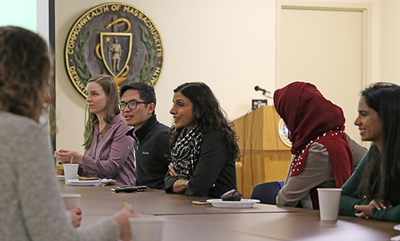Students Gain Real-World Experience with Grant Proposal Competition.
 Public health work keeps people alive—but many public health programs would be unfeasible or unsustainable without public funding.
Public health work keeps people alive—but many public health programs would be unfeasible or unsustainable without public funding.
Now, all first-year School of Public Health students can hone the invaluable skill of grant writing thanks to a grant proposal competition incorporated into the Leadership & Management core course of the MPH program in fall 2018.
The Leadership & Management course has always included a team-based project, but the grant-writing assignment is the first team assignment that drew student participation across all of the first-year cohorts. Harold Cox, associate dean of public health practice and professor of community health sciences, said that the decision to incorporate the project into to the MPH curriculum was based on a number of factors, including student feedback and teamwork opportunities.
“We’re always looking at how we can make improvements to the Leadership & Management class,” Cox says. “It’s important for the class to learn something about working in teams, and we wanted a unique and fun way of engaging all of the students. I was very pleased with the ideas that students came up with, and their willingness to participate in a project like this with more than 350 people.”
At the beginning of last semester, 93 teams of four to five students in the six cohorts received a hypothetical Request for Proposal on current and critical public health issues, specifically safe disposal sites, gun violence, and refugee resettlement. Through project planning, budgeting, and communicating, students produced five deliverables similar to a real-world grant proposal, including a team charter, project statement of need, project plan, budget and budget justification, and a written and oral presentation of the final grant proposal application.
Dan Merrigan, professor of community health sciences, says each team was asked to think beyond pre-determined solutions to the assigned public health problem, to assure capacity for intervention implementation and sustainability.
“We wanted them to consider strategies for change that would bring together stakeholders who may have never collaborated before, and enable them to propose new ways of working together to respond to the true needs of the community,” Merrigan says.
All of the students helped select a winning team for the first two rounds of the competition, and the final three winning teams—one from each proposal topic—were chosen by a group of public health professionals from local agencies. The winners of the debut competition got to meet with Monica Bharel, commissioner of the Massachusetts Department of Public Health, and Monica Valdes Lupi, executive director of the Boston Public Health Commission, to further discuss their proposals.
“The grant-writing project was definitely one of the most useful projects I completed in my first semester,” says Katarina Boehm, who is pursuing the Epidemiology and Biostatistics and Health Policy and Law certificates. Her group won the safe disposal category of the competition by developing a proposal for a needle exchange program called DIMES (Dimock Injection Medical Exchange Service) for the Dimock Center, a community health organization. Boehm says that knowing how to develop and be part of a grant-writing process “is invaluable for anyone working in or with public health.”
Representing Catholic Charities of Boston, September Johnson’s team wrote a proposal for a Cultural Buddies Program, which earned them the winning title in the refugee resettlement category. The program would facilitate partnerships among key faith and cultural communities, as well as healthcare facilities, as a support network for refugees transitioning into new homes.
“Our thought process was that these partnerships would mitigate cultural barriers and increase access to available social and healthcare services within the community, hopefully leading to better physical and mental health outcomes,” says Johnson, who is pursuing a certificate in Community Assessment, Program Design, Implementation, and Evaluation.
She notes that creating a budget was one of the more challenging aspects of the assignment. “When you have $50,000 for a two-year project, you want to make sure you utilize every dollar in the most efficient way,” she says. “As a team, we tried to be as realistic as possible about how we would use the funding if it were to be awarded, but a lot of time was also spent ensuring that the project could be sustainable post-funding.
Andrew Chiao, whose team won best proposal for addressing gun violence, agreed that navigating the financial element of the grant-writing process was a challenge, although his group managed to stay under budget. The group proposed funding for a basketball league expansion and weekly group sessions with youth at the Blackstone Community Center.
Chiao says the experience sparked new interests for him.
“This project equipped me with skills to attempt to enter various areas of public health, such as consulting, that I had not previously considered,” he says. “I feel better equipped with basic public health skills as I head into the rest of my master’s program.”